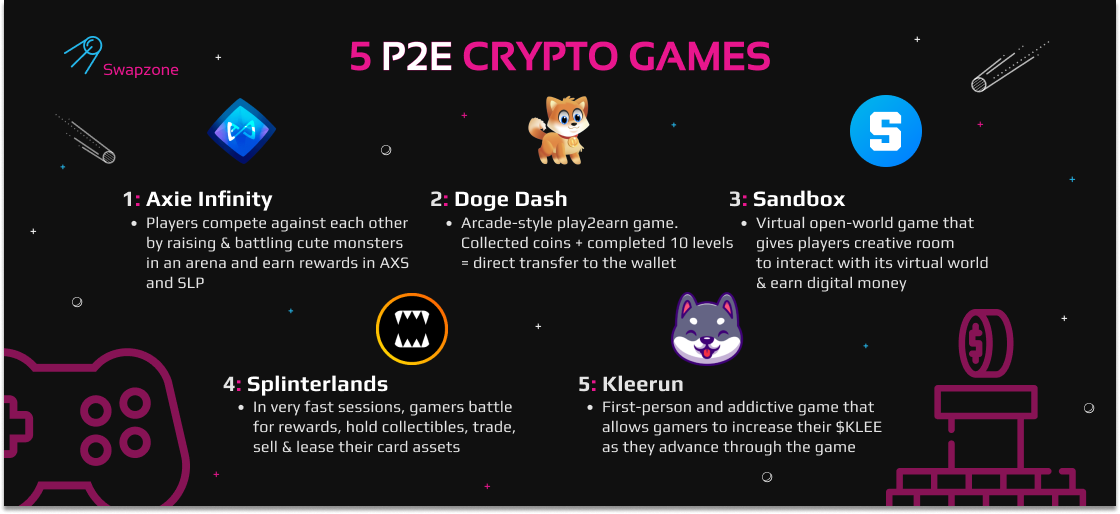Why Play-to-Earn Incentives Are Transforming the Method You Play and Earn
The development of play-to-earn versions signifies a significant shift in the pc gaming landscape, inviting players to discover not only the entertainment worth of games but likewise their potential as income-generating systems. Comprehending these characteristics elevates relevant questions concerning the future of video gaming and the effects for both gamers and designers alike.
Introduction of Play-to-Earn Versions
In the last few years, the video gaming market has actually experienced a substantial change with the development of play-to-earn designs, essentially changing exactly how players engage with digital environments. This innovative strategy permits gamers to get concrete rewards through their in-game activities, creating a shift from traditional video gaming paradigms where pleasure and competitors were the main motivations.
Play-to-earn versions take advantage of blockchain innovation and non-fungible symbols (NFTs) to supply gamers with ownership of in-game assets, which can be traded or cost real-world money. Consequently, gamers are incentivized to spend time and effort right into games, promoting a sense of agency and financial opportunity. play to earn rewards. This change has attracted a varied gamer base, consisting of those who might have formerly seen pc gaming as a simply leisure activity
Numerous platforms have arised, showcasing successful applications of this design, such as Axie Infinity and Decentraland. These platforms have not only produced significant revenue but also sparked conversations around the sustainability and principles of such economic systems. As play-to-earn versions continue to evolve, they promise to redefine the connection in between gamers, designers, and the broader electronic economic climate, paving the way for a brand-new age in gaming.
Advantages for Gamers
As players involve with play-to-earn models, they unlock a variety of benefits that expand beyond simple home entertainment. Unlike standard video gaming, where players invest time and money without substantial returns, play-to-earn systems permit gamers to earn copyright or in-game properties that can be converted to real-world value.
Furthermore, play-to-earn models advertise community building amongst players. Gamers often team up to attain shared objectives, consequently growing social links that enrich the overall experience. This sense of neighborhood can cause participating gameplay, where gamers share approaches and resources, enhancing both individual and team achievements.
Additionally, these designs can democratize accessibility to pc gaming by enabling gamers from varied financial backgrounds to profit monetarily. By taking part in play-to-earn communities, individuals can gain abilities and understanding about blockchain technology, additional broadening their job chances in the growing electronic economic climate. Ultimately, the benefits for players extend well past gameplay, affecting their social, economic, and instructional landscapes positively.
Obstacles in the Ecological Community
While the play-to-earn ecological community presents substantial chances, it is not without its difficulties. One major concern is the volatility of in-game money and assets, which can cause unpredictable revenues for gamers. Fluctuations in value can deter prospective players who look for secure earnings streams - play to earn rewards. Additionally, the complexities of blockchain modern technology may perplex customers not familiar with digital currencies, producing obstacles to entry.
One more obstacle is the risk of scams and deceitful systems that can afflict the environment. Gamers may run into deceptive platforms guaranteeing high incentives yet eventually resulting in monetary loss. Guaranteeing depend on and security is essential for the long-lasting stability of play-to-earn designs.
Moreover, the ecological effect of blockchain video gaming can not be overlooked. The energy usage related to mining and deal processing increases honest questions concerning sustainability. Game designers should locate a balance in between rewarding gamers and lessening eco-friendly impacts.
Finally, the regulatory landscape is still advancing, posturing potential dangers for developers and players alike. Uncertain lawful frameworks can impede development and restrict the development of play-to-earn environments. Dealing with these difficulties is vital for recognizing the complete capacity of this transformative gaming standard.
The Duty of Blockchain Innovation
Blockchain technology acts as the foundation of the play-to-earn ecological community, resolving much of the challenges previously laid out. By using decentralized ledgers, blockchain ensures openness and security in purchases. Players can with confidence make and trade in-game assets, recognizing that possession is verifiable and exempt to manipulation.

Tokenization of possessions plays a vital role, giving players real ownership of their in-game things, which can be purchased, marketed, or traded on different markets. This motivates a dynamic additional market, where players can monetize their abilities and time bought the video game.
Additionally, blockchain technology allows interoperability in between different Discover More Here video games and platforms, enabling gamers to lug their properties across different ecosystems. This versatility not just improves user experience but also advertises a more inclusive pc gaming environment, eventually reshaping the landscape of video gaming and earning.
Future Fads in Gaming
The video gaming sector gets on the verge of a transformative evolution, driven by emerging innovations and changing gamer expectations. As play-to-earn models gain grip, players are progressively looking for immersive experiences that mix entertainment with tangible benefits. This change is triggering designers to innovate, concentrating on creating appealing gameplay that cultivates area and interaction.
One noteworthy pattern is the combination of online truth (VR) and increased truth (AR), improving the video gaming experience by supplying deeper immersion and interactive atmospheres. Furthermore, innovations in expert system are enabling more sophisticated non-player characters (NPCs) and flexible gameplay, customizing experiences to private player preferences.

Final Thought
To conclude, the play-to-earn version is substantially transforming the video gaming landscape by enabling players to obtain real-world value from their Bonuses in-game activities. This paradigm shift not just enhances player involvement and investment but additionally elevates difficulties that should be resolved to make certain sustainability within the environment. As blockchain innovation remains to promote visit the website possession of digital properties, the future of video gaming promises additional advancement and opportunities for gamers across varied backgrounds.